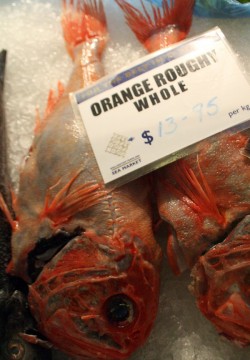Fisheries management priorities all at sea
Blogger: Forest & Bird’s Marine Conservation Advocate, Kirstie Knowles.
Our Ministry of Fisheries has just received possibly the largest wake-up call to fish more sustainably – care of the world’s largest shipping company – Maersk.

Orange roughy: staying put ,
The company announced yesterday* it is refusing to transport Orange roughy, Antarctic toothfish, or any of our shark species, because it believes these fish are being fished unsustainably.
On Radio New Zealand this morning, the Ministry of Fisheries tried to defend the fishing method used to capture orange roughy – a long-lived species (some live up to 130 years) that is caught using highly destructive bottom trawl fishing methods along unique deepwater seamounts, pinnacles and canyons.
Bottom trawling is one of the most environmentally destructive fishing methods in the world.
It employs large nets ranging in size from 4-60m in height and stretching 150-200m in length, in effect taking with it a large amount of bycatch (read: threatened sea-lions, albatross, and other sea-birds). And that’s not to mention what damage it inflicts on our sea-floor.
Meanwhile in a surprise move to environmental groups, the government announced earlier this week, that it is giving $5 million of taxpayer’s money to this very industry via the deep sea industry body Deep Water Group.
These very proposals are whipped up by fisheries managers and the industry group with minimal input from fisheries scientists, not to mention recreational and customary fishing groups.
And, of all the fisheries research done – the deepwater fisheries are the most studied.
Rather than invest yet more money into these rather undesirable fisheries, wouldn’t it be better to invest in understanding our poorly studied inshore fisheries to find out just why we are finding it harder and harder to catch decent-sized fish these days?
Wouldn’t it be better to support fisheries with sustainable fishing practices that do not destroy the marine environment as they operate?
Clearly the Ministry of Fisheries and the Government think not. And things are not set to look any better.
Last week the fishing industry’s Seafood Industry Council was given a green light by Fisheries Minister Phil Heatley to “Manage their own Ship”.
This is part of a lingering plan by the fishing industry to take over some important aspects of New Zealand’s fisheries management – research, observer coverage, management decision making etc.
Some have suggested to me it is like ‘putting the sharks in charge of looking after the baitball’ – and I couldn’t have put it better myself.
Forest & Bird will continue to try to work with our fishing industry and the Fisheries Ministry. But as long as devolution of the management of OUR marine resources continues on this newly invigorated path AND the industry continues to mis-inform New Zealanders and international export markets under the banner “If it’s from New Zealand, it’s sustainable”, we will work to tell the TRUTH.
Clearly, international companies don’t buy this line, and they’re prepared to forgo any business to ensure their operating only with countries that share their values: one of sustainable fishing.
You can help by reading our Best Fish Guide, and supporting those restaurants – like Logan Brown and Burger Wisconsin – that are making the best choices for our oceans.
_______________________________________________________________________________________________________
* UPDATE: Maersk has since reversed this decision (no doubt after pressure from the fishing industry). If you want encourage Maersk to stick with their policy – give ’em a call, or send them an email
In Auckland – 09 359 3499
In Christchurch – 03 365 9101
Or send them an email via this link: http://www.maerskline.com/link/?page=mailform&path=%2Fcontact%2Fsend_an_email&utm_source=content&utm_medium=banner&utm_content=email&utm_campaign=help_contact
